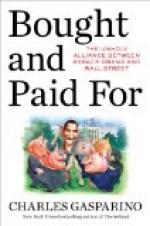In the fifteen years that they had been intimate friends Fred Hadley had grown so accustomed to these periodical outbursts from his old chum Bob Stafford that he seldom paid the slightest heed to his protests. Both self-made men, each had started practically in the gutter and by sheer dint of grit and energy forged his way to the front, the one as a captain of industry, the other as a promoter in railroading and finance. Men of exceptional capacity, success had come easily to them, and with success had come money and power. Hadley was now vice-president of one of the biggest steel concerns in the country, and Stafford had been even more successful. Attracted to railroading he had found employment with a western road, and soon displayed such a positive genius for organization that he quickly excited the attention of eastern railroad men. Quick promotion followed, until, at the end of ten years, he became himself a power in the railroad world. Shrewd deals in Wall Street had already brought him wealth, and the age of thirty-eight found him in control of half a dozen systems, his fortune already estimated at several millions, and his name in the railroad world one to conjure with, not only in Wall Street, but from New York to Frisco.
Irritated at his companion’s silence, Stafford repeated more loudly:
“Do you hear? I’m going to cut it out!”
At last Hadley, his ire roused, looked up.
“Look here, Bob,” he exclaimed impatiently, “you make me tired. You’re a game sport, I don’t think. It wasn’t Maude’s little party that knocked you out.” Pointing significantly to the empty bottles of champagne on the side tables, he went on: “That’s what did you up. Why did you soak yourself with champagne when you got home? Do you know you got away with two quarts of the stuff?”
Stafford passed a hand over his burning brow.
“The deuce I did! I don’t remember. I must have been drunk when I got home. I took the ‘fizz’ to sober up on. Why did you let me?”
“Let you?” echoed Hadley scornfully. “Is there any man alive capable of keeping you from the bottle when you’ve got a thirst on?”
“Yes,” admitted Stafford contritely, “I recall that I was d—d thirsty.”
“And instead of drinking ice water, you rang for champagne. You’re a nice kind of fellow to moralize—you are!”
Rising from the table, Hadley yawned, stretched himself, and, sauntering over to a window, stood looking out upon the busy city below. From that elevation the bird’s-eye view was wonderful. The broad avenues below, teeming with life, the surging, confused mass of pedestrians and vehicles, the close network of side-streets filled with busy traffic, the silvery Hudson with sailing vessels and steamships departing for every port in the world—all this was a scene of which the eye never tired. The young man gazed at it for a moment, and then, retracing his steps, threw himself into an arm-chair. Lighting a cigar, he said:




